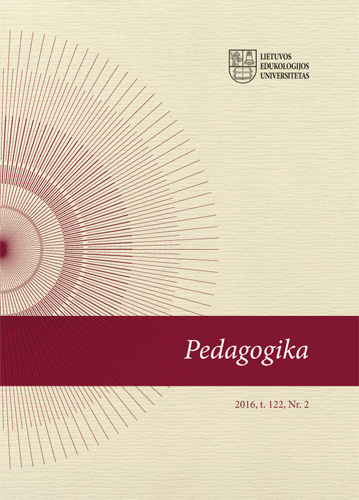Švietimas ar edukacija?
Enlightenment or Education?
Author(s): Liudmila RupšieneSubject(s): Education, Sociology of Education
Published by: Vytauto Didžiojo Universitetas
Keywords: enlightenment; upraising; upbringing; education;
Summary/Abstract: The origin of the term švietimas may be found at the turn of the 18th century in the Age of Enlightenment. Most of society lived in hardship, poverty, and opression with no political rights, lacking even a rudimentary education. In other words, society was in darkness and needed illumination. It is no wonder the era was called the Age of Enlightenment (the Lithuanian term švietimasis based on the word for light). It should be noted that the term enlightenment was used only figuratively to describe the age, while basic pedagogical terms in most of Europe emanated from the Latin word educare. Possibly the most salient event of the Age of Enlightenment in Lithuania was the establishment of the Commission for National Education in 1773. As in other European countries during the Age of Enlightenment, the term education was adopted. But in 1795 most of Lithuania was occupied by Tsarist Russia and Russian laws came into force. In 1802 Ministerstvo narodnogo prosveščenija (Enlightenment Ministry) was established in Russia using the term enlightenment instead of education, which was then copied in Lithuanian. This was a time of intense Russification, and the term švietimas became fixed, pushing out the word edukacija. We might agree with B. Bitinas (2011, 5), that the Tsarist occupation cut short the efforts to solidify the educare concept that was prevalent in Western Europe. More than a century later Lithuania declared its independence and the issue of basic Lithuanian terminology became very relevant. In 1935 S. Šalkauskis first used the word ugdymas as the equivalent of education/erziehung to describe the object of the science of pedagogy. Later, when Lithuania was again occupied and isolated from Western Europe by the iron curtain of the USSR, the use of the term ugdymas as the equivalent of education/erziehung was used more often. This term became fixed in the 1981 textbook “Pedagogika” by B. Bitinas, V. Rajeckas, J. Vaitkevičius, and Z. Bajoriūnas. At the same time, as in all of the USSR, švietimas (prosveshchenije in Russian) was used as an administrative term. The situation changed in 1990 when Lithuania regained its independence. Although the term ugdymas was considered the equivalent of education/erziehung, this stance faltered in 2009 when TESE (The thesaurus for education systems in Europe) officially fixed the term švietimas as the translation of the English term education. From that time the term švietimas is used for education/erziehung when translating documents of the European Union. It should also be noted that in the last few decades the term edukacija is returning to the Lithuanian scholarly lexicon. This term is the most lucid equivalent of education/erziehung, which was formally anchored in Lithuania in 1773, but forgotten due to Russification. With it the concept of educare returns to Lithuania. Maybe the time has come to return to edukacija as the Lithuanian equivalent of education/erziehung and the object of educational science? The Ministry might be called Edukacijos ir Mokslo ministerija, and the term švietimas could retain its figurative meaning.
Journal: Pedagogika
- Issue Year: 122/2016
- Issue No: 2
- Page Range: 5-16
- Page Count: 12
- Language: Lithuanian

